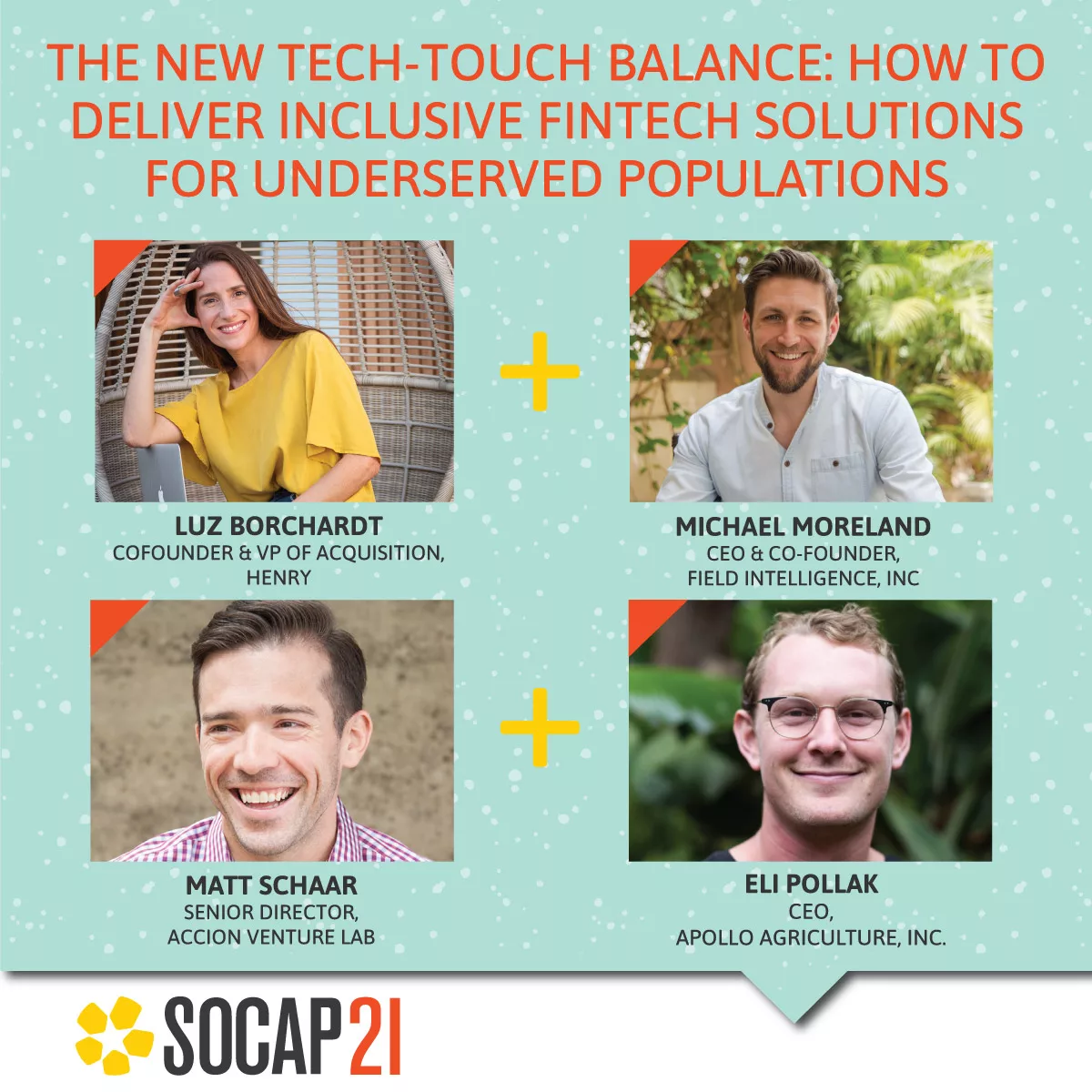From SOCAP21: Delivering Inclusive Technology Solutions to Underserved Populations
Bringing financial services to low-income groups requires both more inclusive technology and human engagement. In wealthier countries where digital adoption is easier and cheaper, most people are rebounding faster from the COVID-19 pandemic. To address this disparity, some fintech providers are working to balance inclusive technology and human touch in delivering these important solutions to the financially excluded.
At SOCAP 21, The New Tech-Touch Balance session led by the Accion Venture Lab featured three inclusive fintech founders who shared how they are confronting this challenge and helping their customers access the digital tools they need to recover.
Moderator Matt Schaar of Accion Venture Lab said the early-stage venture fund aims to support these fintech startups and founders in their work to create a more inclusive world. They often face common challenges, including determining where the in-person relationship with that technology comes into play and overcoming the fact that being digitally native can also be exclusionary. By adopting the right balance of tech and touch, Schaar said, these founders are showing it’s possible to provide more inclusive technology and support the historically underserved in their journey toward financial inclusion.
Luz Borchardt, Co-Founder and VP of Acquisition at Henry, said the Latin American computer science school offers training for software engineers with zero upfront costs in exchange for a portion of their future income (aka an income-sharing agreement, or ISA). The company was founded to challenge the status quo of education, by delivering an intense curriculum to untapped talent and investing in under-represented human potential.
Henry is tackling several challenges at once, Borchardt said: providing affordable financing for high-quality education, addressing income inequality and high unemployment rates, and addressing a skill worker shortage that’s especially acute in Latin America. “Only 14% of the population has access to higher education. Unemployment has climbed during COVID to 12%,” she said. “We always say that education is the best way to solve world inequality, but only if it’s accessible for everyone and high quality.”
Henry attracts a diverse base of students who have varying levels of technological savvy, Borchardt said. “We’re trying to deliver an experience that blends the human interaction — live and online lectures — but also in a fast way, in four months, to get employed.”
The market for Michael Moreland, CEO and Co-Founder of Field Intelligence Inc., is the health care supply chain in Africa. Specifically, Field Intelligence is working with the pharmaceutical market in Nigeria and Kenya, which has seven times too few pharmacies per capita due to numerous challenges.
“What we’ve been trying to do is fix availability and make high-quality products available affordably everywhere and in doing so, really transform this business model,” Moreland said. “The knock-on effect being that there are simply more pharmacies, more places for people to access quality drugs when they need them.”
Software is necessary but not sufficient to accomplish this goal, he said, because the people running small pharmacies need additional help. By serving as a supply chain partner for member pharmacies, Field Intelligence provides an agent network for deliveries, stock management, account management, and other tasks.
“We have to do so much more than just provide another piece of technology. We’ve always been a full-stack startup — both a full-stack software company but also a registered, licensed pharmaceutical distributor,” Moreland said. “We jumped into the value chain and are using that technology to make sure the proceeds and benefits of that are shared with the retailers themselves.”
Providing a variety of services also is the goal for Apollo Agriculture, Inc., where CEO Eli Pollak and his team connect small-scale African farmers with financing and other products to boost their bottom lines.
“Agriculture is the backbone of most economies across sub-Saharan Africa,” he said. “Yet farmers struggle to access the basic financing and tools they need to invest in their farm and make more money. We obviously didn’t discover this problem … but we’ve tried to take a somewhat different approach to addressing it.”
By incorporating inclusive technology to reach more small-scale farmers, Apollo Agriculture helps them scale and become financially sustainable. It’s a challenge to balance tech services and literacy, and apply technology in the most effective ways, Pollak said. “Where we’ve found the most value is at the intersection point between technology and operations,” he said. “When our teams come together, we come up with a solution that is fundamentally better than what either would’ve come up in a vacuum.”
Watch The New Tech-Touch Balance: How to Deliver Inclusive Fintech Solutions for Underserved Populations
Speakers:
Luz Borchardt, Co-Founder and VP of Acquisition, Henry
Michael Moreland, CEO and Co-Founder, Field Intelligence, Inc.
Eli Pollak, CEO, Apollo Agriculture, Inc.
Matt Schaar, Senior Director, Accion Venture Lab, moderator







